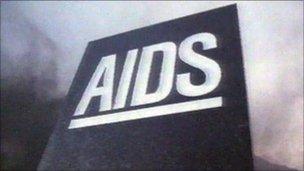HIV efforts 'woefully inadequate' in UK
- Published
Committee chairman Lord Fowler: "I think it's one off the boil as an issue, that's been the real problem"
Efforts to stop the spread of HIV/Aids in the UK are "woefully inadequate" and a new awareness campaign is needed, a House of Lords committee has said.
Its report says the number of people in the UK being treated for the illness trebled in the past decade and almost 100,000 people will have HIV by 2012.
It says better testing must become a priority and suggests relaxing the laws on home-testing kits.
The Department of Health said with no cure, prevention and safe sex were key.
The human immunodeficiency virus (HIV) spreads through bodily fluids and attacks the body's immune system, reducing its ability to fight infection.
Escalating cost
Medical advances in antiretroviral drugs mean fewer people are dying. However, the Lords select committee report warns this is putting "increasing pressure on the health service".
The cost of managing the condition has gone from £500m in 2006-07 to £760m in 2009-10.
"This is not a case for cutting back on treatment," the report said, "it is a case for investing in prevention."
The committee wants a national campaign to raise awareness of HIV and Aids in the same way as the Don't Die of Ignorance campaign in the 1980s.
It cited the success of screening pregnant mothers for HIV and recommends extending the scheme: "HIV testing should be routinely offered and recommended on an opt-out basis to newly registering patients in general practice."

The report calls for a new national campaign to raise awareness of HIV and Aids
It also said "the ban on HIV home testing kits... is unsustainable and should be repealed" as long as the tests were accurate and there was a support network for those who tested positive.
Measures should begin in areas with the highest rates of HIV infection, the report recommends.
Committee chairman Lord Fowler, who ran the 1980s awareness campaign, said: "In the last 25 years the development of new drugs has dramatically reduced the death toll but that should not encourage a false sense of security.
"Acquiring HIV is not remotely consequence-free.
"Prevention must be the key policy. One essential message remains the same as in the 1980s: the more the partners, the greater the risk. Protect yourself. Use a condom."
The Terrence Higgins Trust, which campaigns on HIV and sexual health issues, has released its own plan to reduce HIV transmission.
It wants to halve the number of people who are undiagnosed, increase the numbers taking treatment and target those who put themselves at repeated risk of infection.
The charity's deputy chief executive, Paul Ward, said: "Rising HIV infections are placing an increasing yet avoidable burden on the NHS which hard-pressed budgets can ill afford.
"But we do not have to accept rising costs as inevitable. By renewing our approach to HIV prevention in the UK, by properly involving communities, businesses, charities, individuals and the state we can turn this epidemic around.
"The ways in which we can diagnose and treat HIV have advanced a great deal in 30 years, and making a similar step-change in prevention is well within our grasp."
A Department of Health spokesman said: "There is still no cure and prevention and safe sex are still as vital as... 25 years ago. Wearing a condom with all new or casual partners should be normal practice.
"We need to reduce undiagnosed HIV so testing in a variety health care settings is important - especially in high prevalence areas."
- Published21 March 2011
- Published12 May 2011
- Published23 March 2011